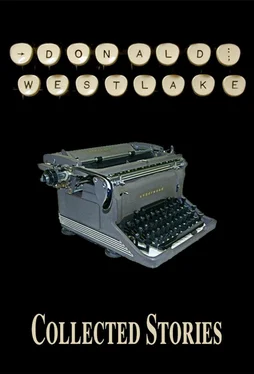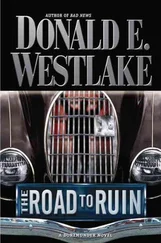Дональд Уэстлейк - Collected Stories
Здесь есть возможность читать онлайн «Дональд Уэстлейк - Collected Stories» весь текст электронной книги совершенно бесплатно (целиком полную версию без сокращений). В некоторых случаях можно слушать аудио, скачать через торрент в формате fb2 и присутствует краткое содержание. Год выпуска: 2020, Издательство: Jerry eBooks, Жанр: Фантастика и фэнтези, Детектив, short_story, на английском языке. Описание произведения, (предисловие) а так же отзывы посетителей доступны на портале библиотеки ЛибКат.
- Название:Collected Stories
- Автор:
- Издательство:Jerry eBooks
- Жанр:
- Год:2020
- ISBN:нет данных
- Рейтинг книги:5 / 5. Голосов: 1
-
Избранное:Добавить в избранное
- Отзывы:
-
Ваша оценка:
- 100
- 1
- 2
- 3
- 4
- 5
Collected Stories: краткое содержание, описание и аннотация
Предлагаем к чтению аннотацию, описание, краткое содержание или предисловие (зависит от того, что написал сам автор книги «Collected Stories»). Если вы не нашли необходимую информацию о книге — напишите в комментариях, мы постараемся отыскать её.
Collected Stories — читать онлайн бесплатно полную книгу (весь текст) целиком
Ниже представлен текст книги, разбитый по страницам. Система сохранения места последней прочитанной страницы, позволяет с удобством читать онлайн бесплатно книгу «Collected Stories», без необходимости каждый раз заново искать на чём Вы остановились. Поставьте закладку, и сможете в любой момент перейти на страницу, на которой закончили чтение.
Интервал:
Закладка:
The window hurled it right back. The calendar-clock bounced off the window, passed Roger at waist-level, and clashed to the floor, where it slid along until it brought up against the far wall, near the door.
Roger gaped in all directions at once, and finally moved forward to gingerly touch the window. It looked like glass, and it felt like glass, but it certainly hadn’t reacted like glass.
“What in the world is it?” he wondered.
“Fluoryl plastic,” said the voice.
Roger jumped. He hadn’t realized he’d asked that question aloud. It was a habit of his, he knew, talking to himself. It was because his three vocations — interior decorating, set designing and department store window display designing — were all essentially solitary occupations. Himself over a drawing board or prowling a presently-shabby living room or pinning a dress to a mannequin, always more or less alone, thinking and deciding and planning, and quite naturally he had developed the habit of voicing his thoughts aloud. Things like, “Red over that fireplace, I should think,” or, “Never do to put an entrance on that side,” or, “Black crepe hangings around the wedding gown would be chic.”
Which brought to mind, once again, the fact that it was morning and Roger should definitely be on his way to work. He was probably late already, and the manager at Wellman’s Department Store was a terror for punctuality.
“Of course I’m late,” he said aloud, struck by the incongruity of it all. “I’m well over a hundred years late.”
He whirled on the wall from which the voice seemed to emanate. “I want to know what’s going on,” he said angrily. “I want to know how I got here and why and when I can expect to go back and just exactly what’s going on here. And I want to know now, this minute.”
Ultimatum delivered, Roger folded his arms and waited, glaring at the wall. But the voice made no sound, and Roger remembered again that he had to ask his questions so that they sounded like questions, or the voice would simply ignore him. “All right,” he said, disgusted. “All right, then. We’ll play it your way. Question number one: How did I get here?”
“You were brought here,” said the voice.
“How?”
“Answer unavailable, involving theoretical physics beyond your mechanical’s understanding.”
“I do not have mechanical understanding,” said Roger. “Oh, wait. You mean you . Well. Was it a time machine?”
“Yes,” said the voice.
“You could have simply said that in the first place,” said Roger reproachfully. “I didn’t want to know the mechanics of the thing. All right, question number two. Who brought me here?”
The voice began to reel off syllables, most of them containing an M or an L or an N, with either A or O for the vowel. A dozen or more of these syllables had poured out before Roger cried, “Stop! Halt! What is that, French?”
“Names,” said the voice.
It took Roger a minute to turn that answer into sense, and then he realized that the voice, literal as ever, had been giving him the names of the men who had built or operated or directed the operation of the time machine that had whisked him here from December 3, 1960.
December 3, 1960. “My Christmas windows!” wailed Roger all at once, remembering what he’d been due to work on today, at Wellman’s Department Store.
“It isn’t fair!” cried Roger. “I never did anything to anybody in 2138. I don’t even know anybody in 2138. And I certainly don’t have any descendants in 2138. I’m not married, and I have no intention of ever becoming married.” A doubt crossed his mind, and he frowned at the wail. “I don’t get married, do I?” he asked.
“Restricted,” said the voice.
Roger blinked. “Restricted? What do you mean, restricted?”
“Word in use in mid-Twentieth Century,” said the voice. “Meaning: applies to facts known to elite but hidden from masses. Usage here adaptation for present needs.”
The voice had an annoying habit, every once in a while, of talking like a telegram, which meant that Roger had to let the words circle around in his head two or three times, while inserting verbs and pronouns and modifiers, until he figured out what the message had been.
The message this time was humiliating. “Do you mean to say,” Roger demanded, “that you are the elite and I am the masses? Or should I say the mass?”
“Usage here,” said the voice, “adaption for present needs.”
“What that means,” snapped Roger, “is that you won’t tell me whether I ever get married or not. Do I have some smart-Aleck great-grandson playing a trick on his old great-granddad, is that it?”
“No,” said the voice.
“Well! A straight answer at last. Then maybe you’ll tell me what I am here for.” Roger paused, grimaced, rephrased the last sentence and said, “What am I here for?”
“Restricted,” said the voice.
“Well, there must be some reason, after all,” said Roger, exasperated. “Is there a reason?”
“Yes,” said the voice.
“But you won’t tell me. I mean, you won’t tell me, will you?”
“No,” said the voice.
“That’s what I thought,” said Roger. He sat down on the edge of the bed and stared gloomily at his pajama-clad knees. The silence lengthened. “I wonder what happens now,” he said to his knees. He looked up at the wall. “What happens now?”
“Whatever you want,” said the voice.
“Then I go right back to December 3, 1960,” said Roger promptly. He stretched out on the bed, folded his hands over his chest, and closed his eyes. “Five in the morning, I think,” he said. “I should like a little more sleep.”
He waited with his eyes closed until he had counted to twenty-five, and then he opened his eyes and looked at a silver ceiling and a golden wall. He hadn’t noticed before that the ceiling was silver. Actually, it blended—
All at once, he sat up and shouted, “Hey!” He glared at the wall. “I thought you said whatever I wanted to happen would happen. Didn’t you?”
“Yes,” said the voice.
“Well, then,” said Roger. “I want to go home. Can’t I go home?”
“Yes,” said the voice.
“Now?”
“No,” said the voice.
“This is infuriating,” cried Roger. He leaped from the bed and advanced on the wall where the voice came from. “I’m going to find you,” he muttered, “and rip out your wiring. Do you hear me?”
“Yes,” said the voice.
Roger growled. The voice was so blatantly, blandly monotonous, so smug and self-assured. It was more than infuriating, it was — enraging. Roger tapped on the wall, trying to hear a difference in tone between one section and another, trying to find a panel or doorway or something that would let him at the voice, and found nothing. And that was even more than enraging. Roger shook his fist at the wall. “I’m going to get you!” he shouted. “Do you hear me?”
“Yes,” said the voice, as calm and monotonous as ever.
“This is ridiculous,” wailed Roger. “Can’t you see it’s ridiculous?”
“No,” said the voice.
“Oh, shut up with your yeses and noes,” Roger snapped. “If you can’t say anything useful, don’t say anything at all.” He paced around the room, smoldering with helpless rage and growing resentment. Stopping by the window, he looked out again at the city. It looked, he thought, like a set for a play about Buck Rogers. And not a very well-designed set at that. No symmetry at all, and a color scheme that very rapidly grew boring. Gold and silver and black, that was all, endlessly repeated. Far away, he could see tiny movement, but couldn’t make sense out of it at all, couldn’t say for sure whether he was seeing the movement of people or automobiles or what. And even with-his forehead pressed to the glass or whatever it was, he couldn’t see down to street-level at the base of tills building.
Читать дальшеИнтервал:
Закладка:
Похожие книги на «Collected Stories»
Представляем Вашему вниманию похожие книги на «Collected Stories» списком для выбора. Мы отобрали схожую по названию и смыслу литературу в надежде предоставить читателям больше вариантов отыскать новые, интересные, ещё непрочитанные произведения.
Обсуждение, отзывы о книге «Collected Stories» и просто собственные мнения читателей. Оставьте ваши комментарии, напишите, что Вы думаете о произведении, его смысле или главных героях. Укажите что конкретно понравилось, а что нет, и почему Вы так считаете.








